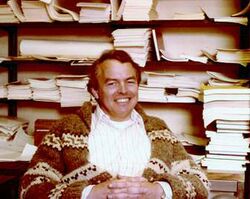Biography:Roger J-B Wets
Roger J-B Wets | |
|---|---|
| Born | February 1937 (age 87) Belgium[1] |
| Alma mater | Université libre de Bruxelles University of California, Berkeley |
| Awards | Frederick W. Lanchester Prize (1997) |
| Scientific career | |
| Fields | stochastic programming |
| Thesis | Programming under uncertainty (1965) |
| Doctoral advisor | George Dantzig David Blackwell |
| Website | www |
Roger Jean-Baptiste Robert Wets (born February 1937) is a "pioneer" in stochastic programming[2] and a leader in variational analysis who publishes as Roger J-B Wets. His research, expositions, graduate students, and his collaboration with R. Tyrrell Rockafellar have had a profound influence on optimization theory, computations, and applications.[2][3][4] Since 2009, Wets has been a distinguished research professor at the mathematics department of the University of California, Davis.[5][6]
Schooling and positions
Roger Wets attended high school in Belgium, after which he worked for his family while earning his Licence in applied economics from Université de Bruxelles (Brussels, Belgium) in 1961.[7] He was encouraged by Jacques H. Drèze to study optimization with George Dantzig at the program in operations research at the University of California, Berkeley.[8] Dantzig and mathematician–statistician David Blackwell jointly supervised Wets's dissertation.[6][9] In 1965 Wets befriended R. Tyrrell Rockafellar, whom Wets introduced to stochastic optimization, starting a collaboration of many decades.[10]
He worked at Boeing Scientific Research Labs, 1964–1970 and was Ford Professor at the University of Chicago, 1970–1972 before being appointed Professor at the Mathematics Department of the University of Kentucky and then University Research Professor (1977–78).[5] While at the International Institute for Applied Systems Analysis (IIASA) in Austria, during 1980–1984,[5] he led research in decision-making in uncertainty, returning as an acting leader in 1985–1987; during that time, Wets and Rockafellar developed the progressive-hedging algorithm for stochastic programming.[2][4] The University of California, Davis named him Professor (1984–1997), Distinguished Professor, and Distinguished Research Professor of Mathematics (2009–).[5]
Awards and contributions

Wets was awarded a George B. Dantzig Prize for "original research that has had a major impact on the field of mathematical programming" by the Society for Industrial and Applied Mathematics (SIAM) and the Mathematical Programming Society (MPS, now the Mathematical Optimization Society).[4] In 1994, the Dantzig Prize was awarded to Wets and also to the French pioneer in nonsmooth computational-optimization, Claude Lemaréchal.[4]
Wets's contributions included developing set-valued analysis, including metric spaces of sets, which he used to study the convergence of epigraphs; Wets's ideas of epigraphical convergence was used to study the convergence iterative methods of stochastic optimization and has had applications in the approximation theory of statistics.[2][4][6][11] A metric theory of finite-dimensional epigraphical convergence ("cosmic convergence") appears in Variational analysis.[11] Wets and his coauthor R. Tyrrell Rockafellar were awarded the 1997 Frederick W. Lanchester Prize by the Institute for Operations Research and the Management Sciences (INFORMS) for their monograph Variational Analysis, which was published in November 1997 and copyrighted in 1998.[3][11]
With Rockafellar, Wets proposed, studied, and implemented the progressive-hedging algorithm for stochastic programming. Besides his theoretical and computational contributions, Wets has worked with applications on lake ecology (IIASA), finance (Frank Russel investment system), and developmental economics (World Bank). He also consulted with the development of professional stochastic-optimization software (IBM).[4]
See also
- Pompeiu–Hausdorff distance
References
- ↑ John Simon Guggenheim Memorial Foundation (1981). Reports of the President and the Treasurer - John Simon Guggenheim Memorial Foundation. John Simon Guggenheim Memorial Foundation.. https://books.google.com/books?id=xbeaAAAAIAAJ.
- ↑ 2.0 2.1 2.2 2.3 (Anonymous 2004)
- ↑ 3.0 3.1 (Anonymous 1998)
- ↑ 4.0 4.1 4.2 4.3 4.4 4.5 (Dantzig Prize Committee 1994)
- ↑ 5.0 5.1 5.2 5.3 (Wets 2011)
- ↑ 6.0 6.1 6.2 (Wets 2011b)
- ↑ (Aardal 1995)
- ↑ In an interview with Karen Aardal, Wets stated that he believed that he took the only course in operations research available (at that time) in Western Europe. The instructor was Jacques H. Drèze at the Université Catholique de Louvain. Because of Drèze's suggestion to study with Dantzig at Berkeley, Wets credits Drèze as being responsible for getting him into the field of optimization. (Aardal 1995)
- ↑ Programming under uncertainty. (1965) Wets, Roger Jean-Baptiste Robert. Abstract Thesis (PhD in Engineering Science)--Univ. of California, Jan. 1965. Bibliography: l. 81-88. Publisher [Berkeley] Repository OCLC's Experimental Thesis Catalog (United States)
- ↑ (Vicente 2004)
- ↑ 11.0 11.1 11.2 (Rockafellar Wets)
Sources
- "Optima interview Roger J.-B. (sic.) Wets". Optima: Mathematical Programming Society Newsletter (Mathematical Programming Society) 46: 3–5. July 1995. http://www.mathopt.org/Old-Optima-Issues/optima46.pdf.
- Anonymous, COSP (1 November 2004). Roger J-B Wets. Pioneers in Stochastic Programming. Committee on Stochastic Programming (COSP). http://www.stoprog.org/Pioneers/Wets.pdf. Retrieved 12 March 2012.
- Anonymous, INFORMS (1998). "Roger J-B Wets, Past awards: 1977 Frederick W. Lanchester Prize: Winner". Institute for Operations Research and the Management Sciences (INFORMS). http://www.informs.org/Recognize-Excellence/Award-Recipients/Roger-J-B-Wets.
- Rockafellar, R. Tyrrell; Wets, Roger J-B (2005). Variational Analysis. Grundlehren der mathematischen Wissenschaften (Fundamental Principles of Mathematical Sciences). 317 (third corrected printing ed.). Berlin: Springer-Verlag. pp. xiv+733. doi:10.1007/978-3-642-02431-3. ISBN 978-3-540-62772-2. http://www.math.washington.edu/~rtr/papers/VarAnalysis-RockWets.pdf. Retrieved 12 March 2012.
- Vicente, L .N. (2004). "An Interview with R. Tyrrell Rockafellar". SIAG/Opt News and Views (Society for Industrial and Applied Mathematics (SIAM), Special Interest Group in Optimization) 15 (1): 9–14. http://www.mcs.anl.gov/~leyffer/views/15-1.pdf. Retrieved 12 March 2012.
- Dantzig Prize Committee (1994). "Citation of Roger Wets (for the George Dantzig Prize, 1994)". Optima: Mathematical Programming Society Newsletter (Mathematical Programming Society) 44: 5. http://www.mathopt.org/Old-Optima-Issues/optima44.pdf. Retrieved 12 March 2012.
- Wets, Roger J-B (31 December 2011). "ROGER J-B WETS (Curriculum Vitae)". Department of Mathematics, University of California, Davis. http://www.math.ucdavis.edu/~rjbw/mypage/Home_files/CV.pdf.
- Wets, Roger J-B (31 December 2011b). "ROGER J-B WETS : Biography-Summary". Department of Mathematics, University of California, Davis. http://www.math.ucdavis.edu/~rjbw/mypage/Home_files/bio.pdf.
External links
- Homepage of Roger J-B Wets at the Mathematics Department of the University of California, Davis. Contains biography, research overviews, lectures and presentations.
 |


